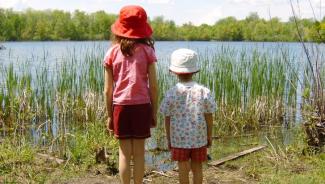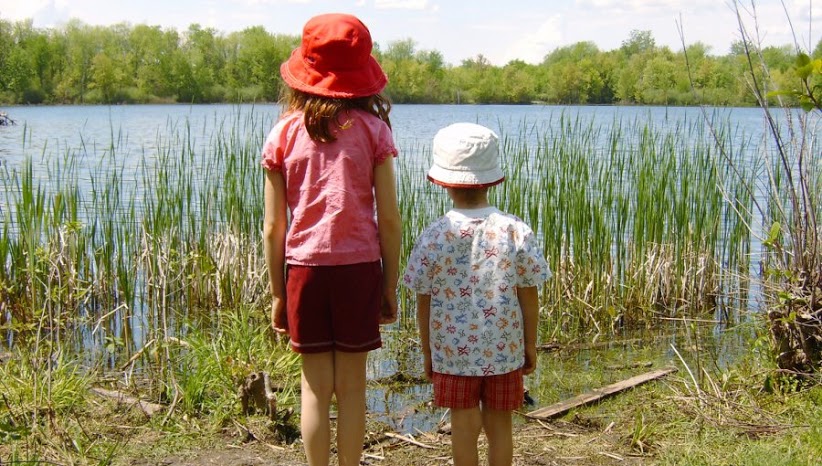A Native Perspective on Earth Day

 The last thing I want to do is perpetuate a stereotype. Every now and then I meet someone who still thinks Native Americans have a “special connection” with the earth—that they can talk to animals or put their ear to the ground and hear a herd of buffalo coming from ten miles away.
The last thing I want to do is perpetuate a stereotype. Every now and then I meet someone who still thinks Native Americans have a “special connection” with the earth—that they can talk to animals or put their ear to the ground and hear a herd of buffalo coming from ten miles away.
None of my Native friends have mystical superpowers. Some of them love to be outside, it’s true, but others would just as soon be in the kitchen or at the computer. My Native friends and family often do have a different perspective than mine, though. And I have learned from them regarding God’s creation and our relationship to it.
Best . . . or Youngest?
Genesis 1 tells us that mankind was the last of God’s creations. I’ve always been taught and read that to mean that God “saved the best for last”—that mankind is the pinnacle of God’s creation, the very point on the pyramid of his creative work. Every commentary I’ve ever checked interprets the passage this way as well.
But when I looked at this passage with a Navajo friend of mine one day, he had a different interpretation. “God is our Father,” he said. “He created everything to be in one family together. And mankind is born last—he’s the youngest brother in the family of creation. We owe the rest of creation our respect and humility.”
I was astonished. His view was both a completely valid way of interpreting the Scripture passage and almost opposite of what I was used to.
Willing to Learn?
How does it change the way we treat creation if we see the birds and animals, plants and trees, oceans and sky all as older siblings in our family, with God as our Father?
I am the eldest in my family, and I know how I want my siblings to treat me. I am protective of them, and I want their respect. I feel honored when they come to me for advice, and I have a responsibility to guide them in right paths. So when I look at the family of creation, do I see my older brothers? Do I treat them with respect, and turn to them for advice and protection?
Scripture encourages us to do so. Proverbs 6:6, for example, exhorts us to learn from the ant, and be wise. In Luke 12:27, Jesus tells us to consider the lilies, and learn from them about God’s love. The psalmist was well aware of the fact that “the heavens declare the glory of God; the skies proclaim the work of his hands. Day after day they pour forth speech; night after night they reveal knowledge.” Our older brothers and sisters have much to teach us. Are we willing to learn from them?
Dominion That Serves
But wait, you say—didn’t God clearly place us over creation in Genesis 1:28, commanding us to subdue it and have dominion over it? Yes indeed. But that doesn’t invalidate our “youngest brother” reading.
Look at how many times God raises the youngest son over his brothers in the Old Testament: Jacob, Joseph, Gideon, and David were all younger sons. It’s one of God’s favorite themes. Even Jesus takes it up, telling us that “the last will be first.” Also, when you read words like “subdue” and “rule over,” remember who is speaking. God’s idea of dominion is pretty different than ours, as Jesus so clearly illustrated when he washed his disciples’ feet.
Could it be that we, the youngest in the family of creation, are called by our Creator to wash the feet of our older siblings?
Earth Day is often about activism, environmentalism, or recreation—sign this bill to protect our rivers, remember to recycle, plant a tree, go for a hike. These things are very good, and you should do them. But what I’ve learned from my Native friends goes deeper than that. It changes my attitude toward the earth; it challenges my very relationship with God’s creation, which is all around me, every day.
I am still working out for myself what it means to live as a younger brother and to treat the birds and the trees, the rocks and the rivers as older and wiser siblings, as well as what it means to exercise appropriate, godly authority over creation. I don’t have it all figured out—far from it—but I’m learning. And I’m thankful to my Native friends for changing the way I see Scripture and, as a result, the way I see the world around me.
Willie Krischke works at Fort Lewis College in Durango, Colorado, with Native American students. He has worked for InterVarsity since 2006. His wife, Megan, is an area director, and they have two kids, Flannery and Soren.
For more Native wisdom, watch Terry LeBlanc’s message at Urbana 12. Or connect with InterVarsity’s Native Ministries on campuses throughout the U.S.



